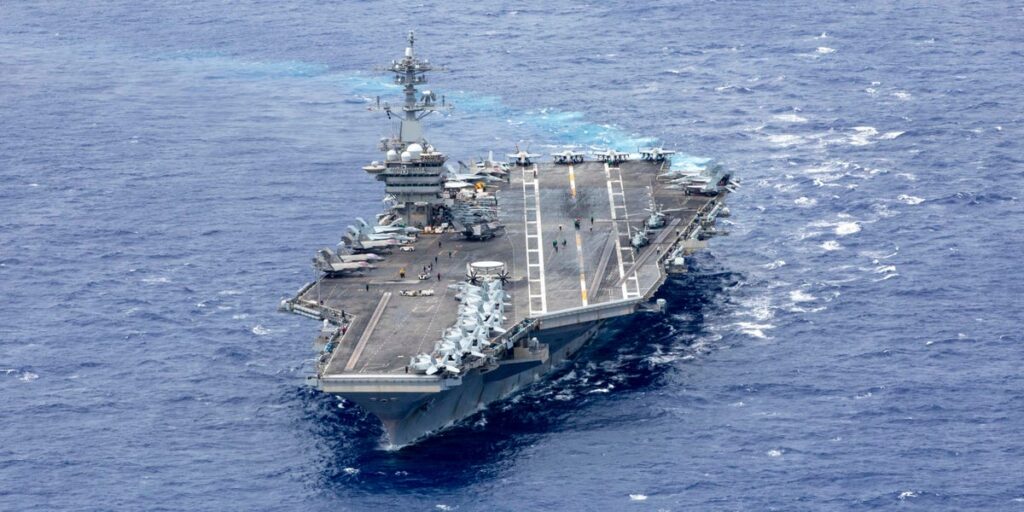- The US Navy’s sole aircraft carrier in the Middle East left the region over the weekend.
- The USS Abraham Lincoln spent months operating there, joining the counter-Houthi fight.
- The US is now without a carrier in the volatile Middle East for the first time in a while.
The US Navy is again without an aircraft carrier in the Middle East; it’s the second time in the past year that it has lacked this capability despite the fighting still going on in the region.
A US official confirmed to Business Insider on Tuesday that the Navy’s sole carrier in the Middle East, USS Abraham Lincoln, left the region over the weekend after several months of operations there.
The Lincoln has since entered the US 7th Fleet area of responsibility, a vast area that includes much of the Indo-Pacific region. It is accompanied by three Arleigh Burke-class destroyers — USS Frank E. Petersen Jr., USS Michael Murphy, and USS Spruance.
The official said that there is no carrier in the Middle East right now. The last time the US had a carrier gap in the region was in June before the USS Theodore Roosevelt arrived to replace USS Dwight D. Eisenhower, which spent months combatting the Iran-backed Houthi rebels.
The Lincoln carrier strike group entered the Middle East in August and overlapped with the TR for several weeks before the latter departed the region in September. Since then, the Lincoln has taken part in the Navy’s ongoing counter-Houthi operations, with its attached F-35Cs conducting their first combat operations.
USNI News first reported on Monday the Lincoln’s departure from the Middle East.
It’s unclear when the Navy could move a new carrier into the region. The US official BI spokle with said the USS Harry S. Truman strike group, which reportedly will deploy there, is operating in the Atlantic near Portugal’s Azores islands.
The US has rotated strike groups — which consist of a carrier, its air wing, and other warships — in and out of the Middle East to help defend military and commercial vessels from the Houthis, who have used missiles and drones to attack merchant shipping lanes in the Red Sea and Gulf of Aden over the past year.
The Pentagon has said that its naval presence, including the carrier strike groups, is meant to be a show of support for Israel and a deterrent against Iran and its regional proxies.
Earlier this month, the Pentagon said that Secretary of Defense Lloyd Austin had ordered the deployment of additional destroyers and aircraft to the Middle East, including fighter jets and B-52 bombers, and that the forces would arrive in the coming months as the Lincoln strike group prepared to depart the region.
US Air Force Maj. Gen. Pat Ryder, the Pentagon press secretary, said at the time that Austin made the force posture changes “in keeping with our commitments to the protection of US citizens and forces in the Middle East, the defense of Israel, and de-escalation through deterrence and diplomacy.”
Though there’s no carrier in the region, the Navy still has four destroyers operating in the Middle East and several warships in the Eastern Mediterranean, the US official said. These assets are positioned not far from Israel’s wars against Hamas and Hezbollah in Gaza and Lebanon, respectively.
Read the full article here
















